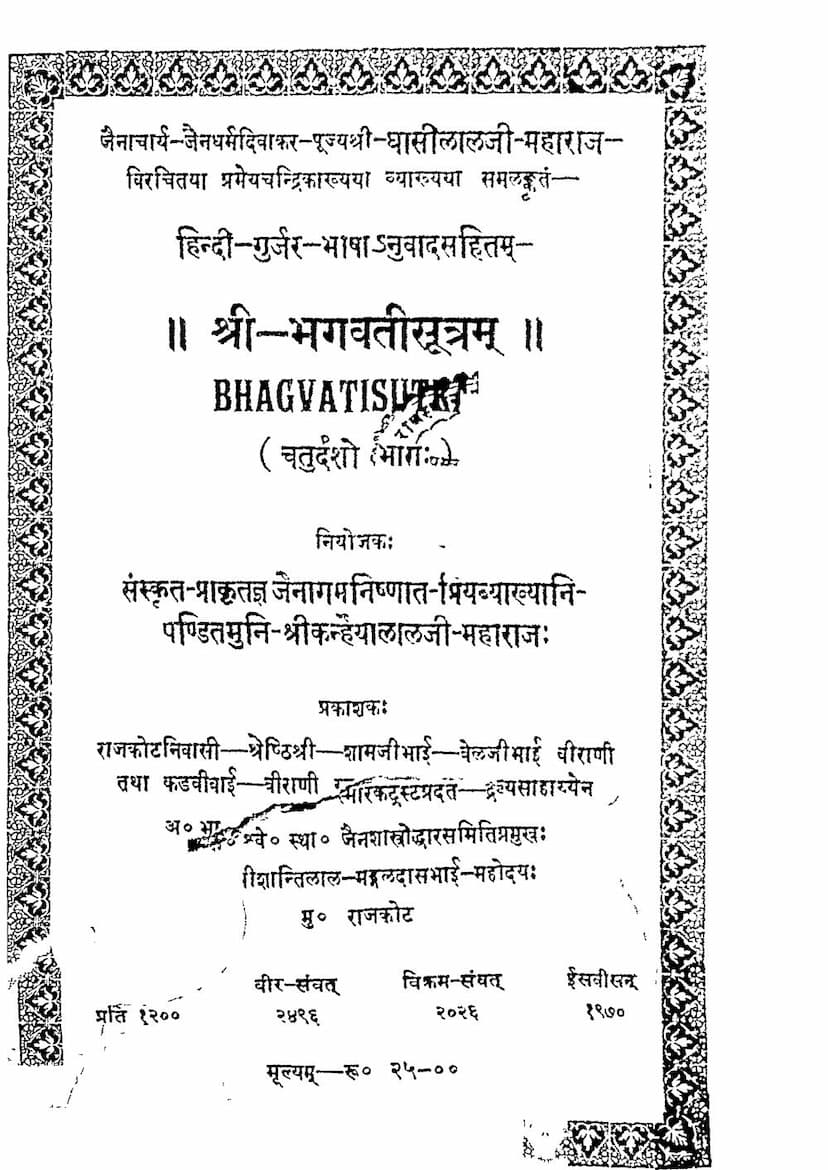Bhagwati Sutra Part 14
Added to library: September 1, 2025

Summary
Summary of the Bhagwati Sutra, Part 14 (as presented in the provided text)
This summary is based on the provided text, which appears to be the 14th part of the Bhagwati Sutra, with commentary by Ghasilal Maharaj. The text covers several sections, detailing the results (parinama) of various types of beings and the nature of karma and bondage, along with biographical information about a devout Jain follower.
Key Themes and Content:
The provided pages are primarily from the introduction and the beginning of the Bhagwati Sutra commentary. They focus on:
- Title and Author: The book is identified as "Bhagwati Sutra Part 14," authored by Ghasilal Maharaj, and published by A B Shwetambar Sthanakwasi Jain Shastroddhar Samiti. The catalog link is provided.
- Publisher and Dedication: The publisher is Shri Akhil Bharat S. S. Jain Shastroddhara Samiti, Rajkot. The publication was made possible by the financial contribution of Preishri Shamjibhai Beljibhai Chirani and Phadviwai Chirani.
- Introductory Verses: The initial pages include Sanskrit verses and their Hindi translation, expressing the author's confidence in the timeless nature of his work and the eventual recognition of its value.
- Table of Contents (Vishayanukramank): A detailed index is provided, outlining the contents of Part 14, which spans from the sixth to the twenty-fifth chapter (Uddesha), covering various aspects of Jain cosmology, karma, and the nature of different beings.
- Chapters 6-11: These deal with the results (parinama) of earthly beings, water-bodied beings, the nature of bondage, karma bhoomis, continuity of scripture (kalikshrut), and the paths of those with attained powers (labdhi) and those who practice austerities (jayacharana). It also covers the concept of life-span (ayushya) based on upakram (active cause) and nirupakram (inactive cause), and the origin of hell-dwellers (nairayika) and their attributes.
- Chapters 12-25: These chapters delve into the continuation of topics related to the results of various beings, specifically focusing on the nature of souls residing in plants. It details the presence of life in different parts of plants like roots, tubers, and fruits, classifying them based on their structure and the types of souls they harbor. The text also explores the origins and characteristics of various celestial beings (devas) and their rebirths.
- Chapters 26-36: These continue the detailed classification and analysis of life within various types of plants and other elemental beings, further exploring their origins and states.
- Chapters 37-50: The latter part of the index touches upon the outcomes (parinama) of hell-dwellers, celestial beings (asurkumar, nagakumar), and their interactions with various life forms, including their origins and classifications.
- Biographical Sketch of Vinod Muni: A significant portion of the text is dedicated to the concise biography of Vinod Muni (previously Vinodkumar Virani). This sketch highlights his:
- Family background: Born in Rajkot, Saurashtra, to Seth Shri Durilal Shamjibhai Virani and Maniben Virani.
- Spiritual inclination: Despite receiving a worldly education and excelling in business, he was drawn towards spiritual studies and renunciation from a young age due to past life merits.
- Extensive travels: He traveled to various countries, including the UK, France, Belgium, and Egypt, witnessing beautiful places and cultures, yet remained unaffected by worldly temptations, attesting to his deep spiritual inclinations.
- Ascetic lifestyle: He renounced worldly comforts, slept on the floor, wore simple khadi clothes, and maintained strict religious practices like Samayika and Pratikramana even while traveling.
- Dedication to Jain principles: He actively preached the principles of non-violence and inspired others to embrace spirituality.
- Initiation (Diksha): The text narrates his determined decision to take initiation (diksha) despite parental hesitation, seeking the guidance of Muni Shri Samarthlalji Maharaj in Khichan, Rajasthan. His courageous and independent decision to take initiation is detailed, including the circumstances surrounding it.
- Martyrdom: The biography culminates with the tragic yet heroic account of Vinod Muni's passing while saving cows from a train, sacrificing his life for the sake of compassion and non-violence. His martyrdom is depicted as an act of ultimate devotion to the principles of Jainism.
- Inspirational Quote: "Asankhayam jivam ma pramadae" (Do not be negligent of the immeasurable life) is presented as an inspiration.
- List of Patrons: Several pages are dedicated to listing the names of esteemed patrons and donors who supported the publication of the Bhagwati Sutra.
Overall Impression:
The provided text offers a glimpse into the vastness of Jain scripture, specifically the Bhagwati Sutra. It highlights the detailed philosophical and cosmological explanations within Jainism, covering the consequences of karma, the nature of souls, and the intricacies of various realms. The inclusion of Vinod Muni's biography adds a dimension of human inspiration, showcasing the profound impact of spiritual devotion and the adherence to Jain principles even in the face of adversity. The detailed index suggests a comprehensive exploration of Jain teachings within this volume.